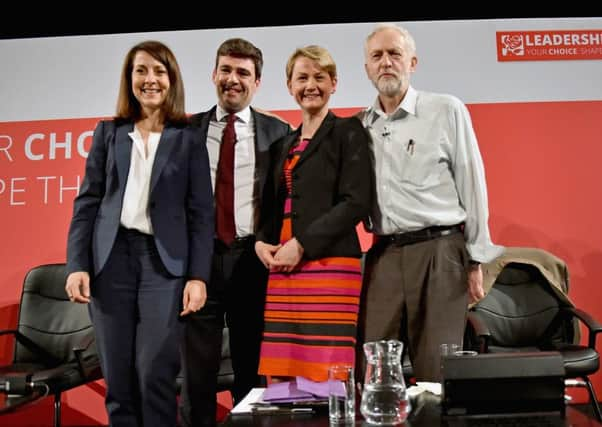Martyn McLaughlin: Corbyn win bad for Scots Labour


If there were any lingering doubts over the legitimacy of Jeremy Corbyn’s challenge for the Labour leadership, the reports at the weekend revealing how senior figures in the party are already adopting a state of Machiavellian preparedness in the event of his victory should be seen as indicative of his growing support.
Even in the internecine world of Labour, talk of coups is not embarked upon half-heartedly. The veteran left-winger may hail from the party fringes, but as the days go by, his unlikely claim to the top job is seen as increasingly credible.
Advertisement
Hide AdAdvertisement
Hide AdHow this impacts on Scottish politics promises to prove fascinating. Senior figures in the SNP have expressed optimism over the prospect of the one-time 100/1 outsider seeing off the challenge of Andy Burnham, Yvette Cooper and Liz Kendall.
Former First Minister Alex Salmond said that, while he expects Burnham to triumph and, in any case, disagrees with Corbyn on the cause for full independence for Scotland, it would “not be as difficult” to form a Westminster alliance with the 66-year-old – based predominantly on his vocal opposition to welfare cuts and the renewal of Trident – as it would be with his contenders for the Labour top job.
“You wouldn’t have to ask Labour spokespeople how they were going to vote next Monday or Tuesday, you would know,” Mr Salmond reflected. “At least he has a number of stated positions which people could rally around.”
Others in the SNP have made cautious sounds about Corbyn’s prominence in the leadership debate. In an interview last week, before the New Statesman shocked the political fraternity with details of internal polling which put Corbyn ahead in the first round, Angus MacNeil MP admitted Corbyn was the figure the SNP feared the most given his ability to win back disillusioned Labour voters in Scotland.
“The one guy we’d feel has the most to sort that, who has got the courage and the vision is … Jeremy Corbyn,” he said, before adding: “But he’s never going to get it, so we don’t fear any of them as a result of that.”
In light of Corbyn’s blossoming influence with Constituency Labour Parties, Mr MacNeil may have cause to reconsider the assurance with which he made that appending prediction. As things stand, the apparently contradictory view held by those in the SNP towards Corbyn is practicable. He is a useful danger to the Nationalist cause, a potential Labour leader who might expose the SNP’s illiberal tendencies, but one who would ultimately unite with Angus Robertson MP and his colleagues on areas of shared interest.
Talk of this fragile harmony, however, is a sideshow that is capturing the attention of those in Scottish political circles intent of viewing Corbyn solely through the prism of the SNP. A hypothetical issue far more pressing is the unintended consequences his victory might have for Labour’s prospects here. The veteran Islington North MP’s burgeoning authority is wrongly accepted as a boon for the Scottish Labour movement. In fact, it could add insult to a party critically injured by the general election result and the independence referendum.
While it is true that the former trade union official’s brand of unreconstructed Bennite Labour politics would win back disenchanted members of the party’s tribe north of the Border, it would ultimately risk undermining a beleaguered and rudderless Scottish Labour trying to chart a roadmap out of the electoral wilderness.
Advertisement
Hide AdAdvertisement
Hide AdNeither Kezia Dugdale nor Ken Macintosh could be described as subscribers to Corbyn’s politics, a doctrine many disconnected former Labour voters of a certain generation accuse the party of jettisoning. And in fairness, neither should they be; the malaise at the heart of Scottish Labour has little do with class and everything to do with its complacency, entitlement and drifting relevance to a modern Scotland.
But as it seeks to win back those on the Left who have turned to the SNP and the Greens, any votes secured by Corbyn would come at a heavy cost to the party at Holyrood – Scottish Labour would find even the most progressive of its reforms deemed inadequate and, worse still, conservative, in comparison to the UK approach.
The long mooted desire held by some in Scottish Labour to disaffiliate its from the influence of London could well come to pass in potentially catastrophic fashion. The SNP could forge a constructive opposition with Labour against a Tory-led austerity agenda at Westminster while at the same time consolidating its influence in the lead up to next May’s Holyrood elections by exploiting the ideological divisions between Corbyn’s Labour and the moderate mandate likely to be put forward by Dugdale or Macintosh as they seek to become an electable force.
Even if Corbyn’s bid for the leadership proves unsuccessful, Scottish Labour will have to deal with the fallout as part of its rebuilding programme. His authenticity and consistency has resonated with many Labour supporters seeking a standard bearer. Whoever the new Scottish leader is come September, they will have their work cut out to strike a similar chord.
Chuka Umunna, the shadow business secretary who withdrew from the UK leadership race, gave a prescient warning. “People have got to consider what message the result will send to the public,” he said. “It’s not just about who wins this contest, it’s the shakedown of the results.”
It is a cautionary note that must be heeded by all of Labour, but Scottish Labour in particular. The party is still wounded and reeling as it searches for a revitalised identity and sense of purpose. The SNP’s continuing appropriation of the Left will make that latter task an onerous one, but in Keir Hardie’s centenary year, it would be a painful irony for Scottish Labour if an old school socialist emerged as the latest obstacle to its tentative rehabilitation.